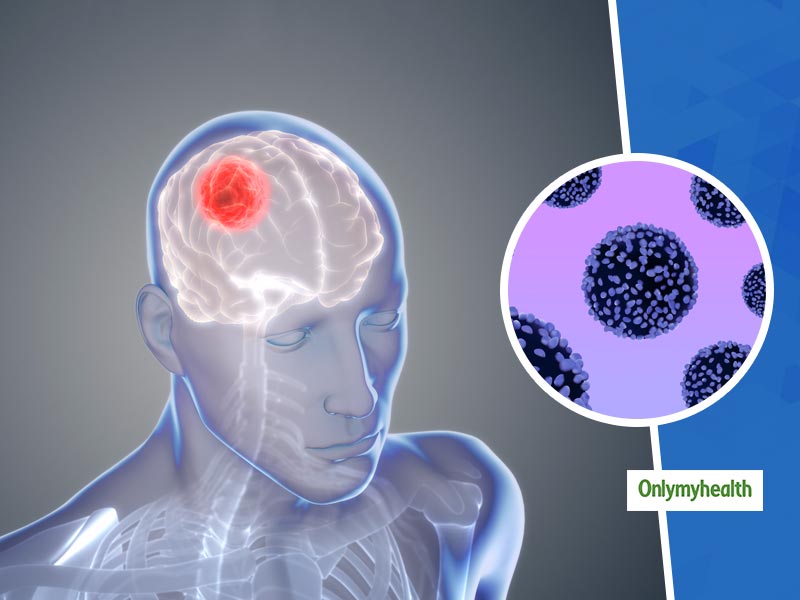
World Brain Tumour Day 2020: Growth of abnormal cells in the brain is known as a brain tumour. These can be categorised as primary or secondary depending on the location of origin of cancer. Around 45% of the brain tumour is cancerous. While the condition can prove to be life-threatening if not diagnosed timely, causes gradual brain damage. As per the recent survey of Globacan India 2018 factsheet, at least over 28000 new cases were registered and around 24000 lost their lives suffering from this ailment. The exact cause of brain tumour hasn’t been found yet, and it is clear that the brain tumour is contagious though.
Table of Content:-
Early identification of Brain Tumour
The symptom of brain tumour largely depends on the tumour type, size or location. The most common and apparent symptoms are headache, vomiting, problem while walking and balancing, numbness in arms and legs changes in mood, personality, speech, vision etc. Other significant symptoms include severe headaches that worsen in the morning, nausea, seizures weakness in the face or hands and difficulty in body movements.
Also read: Constant Headaches Can be a Symptom of Glioblastoma Multiforme
Types Of Brain Tumour
A brain tumour or cancer is an abnormal growth of cells in the brain, i.e. the Grey mater/or White mater/ & Meninges. A brain tumour can arise in any of the three parts and is classified into two main categories primary and secondary tumour. Primary tumours begin primarily within the brain tissue and can be either cancerous or benign (pure tumour), while the Secondary tumours are always malignant and arise from outside the brain. They are named as per the type of the cells or the part of the brain in which they appear.
PRIMARY TUMOURS: A few things you need to know about these types of tumours
- Primary tumour of the brain is of various types like Glioma or Astrocytoma, Ependymoma, Oligodendroglioma, Medulloblastoma, Germ cell tumour etc. Out of this, Glioma is the most common primary cancerous brain tumours. They are commonly seen in the general adult population, but lately, its occurrence has increased in young people too.
- Primary benign tumours are not cancerous and can be entirely treated after surgical removal. Various types of benign tumours are Meningioma, Pineal tumour, Schwannoma, Craniopharyngioma etc. Most common primary brain tumour seen in the adult female population is Meningioma.
Also Read: Mental Wellness: The Key To Employee Health
SECONDARY TUMOURS: A few things you need to know about the secondary tumours
Secondary tumours are commonly seen in the older population. Here the cancer cells spread to the brain from cancer already present in the body affecting another organ. They are more common in occurrence than primary brain cancer.
Minimally Invasive Surgery For Brain Tumours (Treatment Of Brain Tumours)
- Unlike earlier times, brain tumours can be cured without undergoing severe surgeries. In comparison to conventional brain tumour surgeries which are almost open surgeries, endoscopic brain tumour surgery is the latest minimally invasive procedures providing ease of access to the treating surgeon and preserving the cosmetic appeal as well. Surgeons can have a real-time analysis of the brain as the endoscope enters the targeted location, allowing them to penetrate deep into the brain where conventional surgeries fail quickly.
- Being completely safe for the adjoining brain tissues; this procedure requires less hospitalisation and quicker recovery. This not only gives a better chance to the patient to live a remarkable functional life but also confirms the diagnosis of the tumour is cancerous or benign. Once the biopsied tumour confirms tumour as a malignant patient needs further treatment with chemotherapy and radiotherapy. Once treatment is complete patient requires physical and social rehabilitation to get back his healthy life by allowing him to perform the activities of his daily living as soon as possible.
(The article has been reviewed by Dr Puneet Gulati, Consultant Neurosurgery, Saroj Super Speciality Hospital, New Delhi)
Read more articles on Cancer
Read Next
Blood Cancer & Stem Cell Transplant: How Stem Cells Can Give Blood Cancer Patients A Second Chance
How we keep this article up to date:
We work with experts and keep a close eye on the latest in health and wellness. Whenever there is a new research or helpful information, we update our articles with accurate and useful advice.
Current Version
